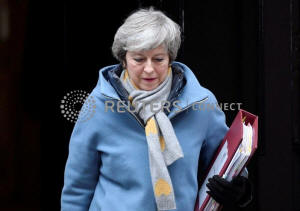|
Brexit crisis deepens as British
lawmakers to vote on no-deal exit
 Send a link to a friend
Send a link to a friend
 [March 13, 2019]
By William Schomberg and Michael Holden [March 13, 2019]
By William Schomberg and Michael Holden
LONDON (Reuters) - Britain's parliament
will vote on Wednesday on whether to leave the European Union in 16 days
without an agreement as the government said it would eliminate import
tariffs on a wide range of goods in a no-deal Brexit scenario.
British lawmakers on Tuesday handed Prime Minister Theresa May a second
humiliating defeat on the Brexit plan she had agreed with the EU,
plunging the country deeper into political crisis.
The turmoil leaves the world's fifth largest economy facing a range of
scenarios - it could leave without a transition deal; delay the March 29
divorce date enshrined in law; May could hold a snap election or try a
third time to get her deal passed; or Britain could hold another Brexit
referendum.
On Wednesday, parliament is expected to reject a no-deal Brexit in a
vote at 1900 GMT, although this will have no legal force. On Thursday,
it will then vote on whether to ask the EU for a delay to Brexit,
something to which all the bloc's other 27 members must agree.

EU Brexit negotiator Michel Barnier said the bloc would need to know why
Britain wanted to extend talks and it was up to London to find a way out
of the deadlock.
"If the UK still wants to leave the EU in an orderly manner, this treaty
is - and will remain - the only treaty possible," Barnier told the
European Parliament in Strasbourg.
However, the default position, if nothing else is agreed, remains that
Britain will exit with no deal on March 29, a scenario business leaders
warn would bring chaos to markets and supply chains and other critics
say could cause shortages of food and medicines.
Supporters of Brexit argue that, while a no-deal divorce might bring
some short-term instability, in the longer term it would allow the
United Kingdom to thrive and forge trade deals across the world.
TARIFFS
Unveiling details of a tariff plan that would last for up to 12 months
in the wake of a no-deal scenario, the government said 87 percent of
total imports to the United Kingdom by value would be eligible for
tariff-free access, up from 80 percent now.
Some protections for British producers would remain in place, including
for carmakers - major employers in Britain - and beef, lamb, pork,
poultry and dairy farmers. But it would expose other manufacturers to
cheaper competition.
The government also said it would not introduce checks on goods moving
from the Irish Republic to Northern Ireland, a major concern among Irish
politicians who fear a hard border could see a return of violence which
blighted the British province for more than 30 years until a 1998 peace
accord.
[to top of second column]
|

British Prime Minister Theresa May walks outside Downing Street in
London, Britain March 13, 2019. REUTERS/Toby Melville

May has said the government would not instruct lawmakers from her
own Conservative party, bitterly divided over Brexit, on how to vote
on Wednesday, as would normally be the case.
Sterling rallied more than half a percent, trading around $1.3150,
on growing expectations that lawmakers would vote against no deal.
But Brexit minister Stephen Barclay said it remained preferable to
staying in the EU.
"If you pushed me to the end point where it's a choice between no
deal and no Brexit ... I think no deal is going to be very
disruptive for the economy and I think no deal also has serious
questions for the union," he told BBC radio.
"But I think no Brexit is catastrophic for our democracy. Between
those very unpleasant choices, I think no Brexit is the bigger
risk."
The EU said there could be no more negotiations with London on the
divorce terms, struck with May after two-and-a-half years of
tortuous negotiations.
Britons voted by 52-48 percent in 2016 to leave the bloc, a decision
that has split the main political parties and exposed deep rifts in
British society.
Many fear Brexit will divide the West as it grapples with both the
unconventional U.S. presidency of Donald Trump and growing
assertiveness from Russia and China, leaving Britain economically
weaker and with its security capabilities depleted.

Supporters say it allows Britain to control immigration and take
advantage of global trade opportunities, while keeping close links
to the EU.
(Additional reporting by Elisabeth O'Leary and Alastair Macdonald in
Brussels; Writing by Michael Holden; Editing by Janet Lawrence and
Guy Faulconbridge)
[© 2019 Thomson Reuters. All rights
reserved.]
Copyright 2019 Reuters. All rights reserved. This material may not be published,
broadcast, rewritten or redistributed.
Thompson Reuters is solely responsible for this content. |